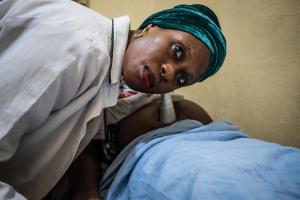Restoring people’s trust in medical facilities an essential prescription for achieving universal health coverage
22 August, Brazzaville - Populations across the 47 Member States of the World Health Organization’s (WHO) African Region only utilize an average 48% of their available health services. But only an average 34% of those same populations even has access to essential services. And health systems in those countries only perform, on average, at 49% of their possible level of functionality.
The WHO universal health coverage agenda seeks to diminish these gaps by strengthening district and local health systems in their delivery of services to all people.
During a side event at the 69th Regional Committee for Africa, which is the WHO governing body involving health ministers, delegates discussed their country’s experiences and insights for advancing the universal health coverage agenda.
Angola, for example, achieved efficiency gains by improving its procurement and supply systems. High costs and weak supply chain management had been a major challenge to the uninterrupted supply of essential medicines. Through reduced taxation on essential medicines and increased taxes on alcohol and tobacco, along with advocacy for increased domestic funding for medicines and the introduction of a transparent national electronic contracting system for medicine procurement, Angola improved its management – and availability – of essential drugs.
In Togo, poor management of the health system resulted in the loss of public trust in hospitals. After a government-led assessment of the health system, a private company was contracted to develop a management system that indeed improved service delivery in hospitals. The reform restored communities’ trust in the health services. That public-private partnership is now being scaled up to all health facilities. The Government plans to partner with faith-based organizations for the management of some health facilities.
In Côte d’Ivoire, political conflict (between 2002 and 2011) led to a weakening of the health system. To turn the situation around, health sector reforms focused on rehabilitating hospitals as well as constructing and equipping new health facilities. Decentralization of the supply chain management system for essential medicines aimed to ensure local ownership and improve people’s access to the drugs they need. The introduction of a health insurance scheme sought to lessen the financial hardship of health care for households.
Universal health coverage became the flagship programme of the WHO Regional Office for Africa in 2017, with the intention of helping each Member State in the reform of their respective health system. To accelerate the efforts and results, the health ministers adopted today the Framework of Essential Health Services through Local and District Health System Strengthening for UHC during the 69th session of the WHO Regional Committee.
“Through stronger district and local health systems, more populations will be reached with quality services that address their needs and are affordable, thus expediting progress to universal health coverage,” said Dr Matshidiso Moeti, WHO Regional Director for Africa. “This framework will help steer countries in that direction with priority actions that also aim to leave no one behind.”
Local health systems ideally should engage families and communities, build their knowledge on health and create demand for health services. They also should promote ownership through the co-management of health services between health workers and the populations they serve.
The delegates to the annual WHO meeting in Brazzaville recommended including universal health coverage as a standing item on the agenda of every Regional Committee. They also agreed that alternative sources of funding, such as health insurance, high-level political commitment and leadership, good health management and governance systems, a multisector approach and an emphasis on equity are essential elements for delivering universal health coverage across Africa.
Communications and marketing officer
Tel: + 242 06 520 65 65 (WhatsApp)
Email: boakyeagyemangc [at] who.int (boakyeagyemangc[at]who[dot]int)
Communications Manager
WHO Regional Office for Africa
Email: okas [at] who.int (okas[at]who[dot]int)
Tel: +242 06 508 1009
Ebola communications officer
Email: savages [at] who.int (savages[at]who[dot]int)



